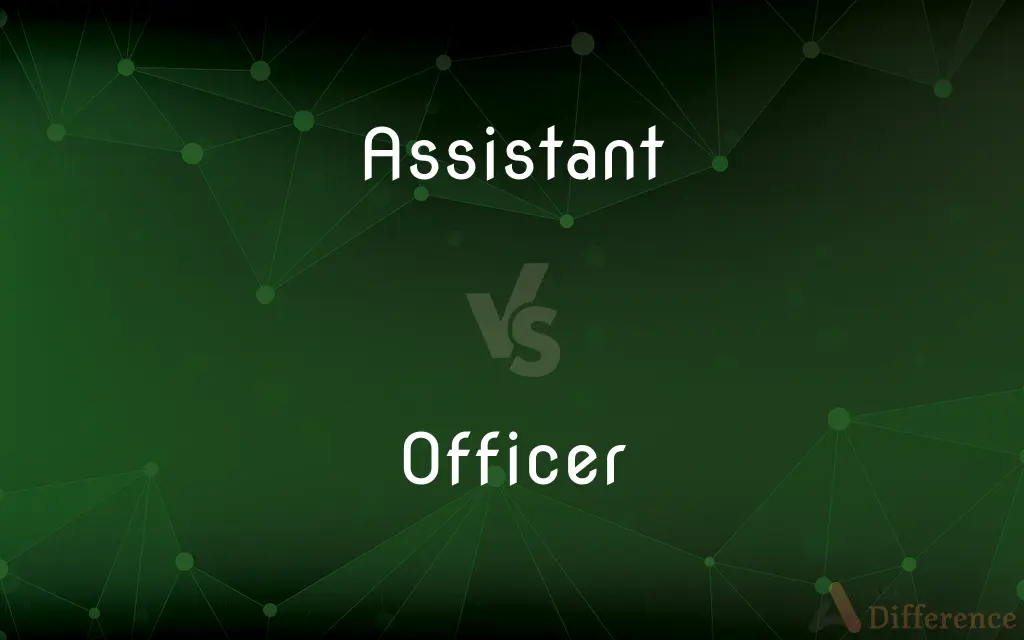Assistant vs. Officer — What's the Difference?
By Maham Liaqat & Urooj Arif — Updated on March 1, 2024
An assistant provides support and helps in various tasks to ensure smooth operations, often in administrative roles, while an officer holds a position of authority, typically within organizations or the military, responsible for specific duties.

Difference Between Assistant and Officer
Table of Contents
ADVERTISEMENT
Key Differences
Assistants are crucial in both corporate and personal settings, providing support to ensure the efficient functioning of offices, executives, or specific departments. Officers, on the other hand, occupy positions of authority and are tasked with overseeing specific areas within an organization, government, or the military.
Assistant roles often encompass administrative tasks, scheduling, communication facilitation, and other supportive duties. For example, an executive assistant helps manage the schedule of a senior executive, ensuring they can focus on strategic decisions. Officer responsibilities may include decision-making, strategic planning, and managing teams or departments. In a corporate setting, a chief financial officer (CFO) oversees the financial operations of a company, making crucial decisions related to financial planning and risk management.
The main distinction lies in the level of responsibility and authority. Assistants typically work under the guidance of an officer or executive, focusing on support and facilitation tasks. Officers are responsible for making decisions that affect the direction and strategy of the organization or department they lead.
Assistants might specialize in organizational and administrative tasks, officers are expected to have a broader understanding of their field, including strategic planning and leadership skills. For instance, an assistant may organize meetings and manage communications, while an officer would lead those meetings and make decisions based on the discussions.
Both roles are essential to the smooth operation of any organization but serve different purposes. Assistants ensure that officers can efficiently perform their decision-making and leadership roles by handling logistical and administrative tasks.
ADVERTISEMENT
Comparison Chart
Role
Supportive, focused on helping and facilitating
Authoritative, focused on decision-making and management
Responsibilities
Administrative tasks, scheduling, communication
Strategic planning, overseeing operations, leadership
Authority Level
Typically lower, operates under supervision
Higher, possesses significant autonomy and control
Skills
Organizational, administrative, communication
Leadership, strategic planning, specialized knowledge
Examples
Executive assistant, administrative assistant
Chief Financial Officer (CFO), police officer
Compare with Definitions
Assistant
Acts as a liaison between departments and external parties.
The assistant ensured smooth communication between the sales and marketing teams.
Officer
Oversees strategic planning and decision-making in a corporation.
The Chief Operating Officer (COO) implemented a new operational strategy.
Assistant
Helps in administrative tasks to ensure office efficiency.
The administrative assistant was responsible for filing and data entry.
Officer
Leads departments and teams towards achieving organizational goals.
The marketing officer launched a successful advertising campaign.
Assistant
Provides logistical support for events and projects.
The assistant helped coordinate the company retreat.
Officer
Holds a position of authority within the military.
The naval officer commanded the fleet during the mission.
Assistant
Facilitates operations within departments.
The research assistant gathered data for the study.
Officer
Enforces laws and maintains public safety.
The police officer responded to the emergency call promptly.
Assistant
Supports executives by managing schedules and communications.
The executive assistant organized the CEO's daily meetings.
Officer
Manages financial operations and planning in a company.
The Chief Financial Officer (CFO) led the quarterly budget review.
Assistant
One that assists; a helper.
Officer
An officer is a person who has a position of authority in a hierarchical organization.
Assistant
Holding an auxiliary position; subordinate.
Officer
One who holds an office of authority or trust in an organization, such as a corporation or government.
Assistant
Having a subordinate or auxiliary position.
An assistant surgeon
Officer
One who holds a commission in the armed forces.
Assistant
A person who assists or helps someone else.
Officer
A noncommisioned officer or warrant officer.
Assistant
Of the second grade in the staff of the army; as, an assistant surgeon.
Officer
A person licensed in the merchant marine as master, mate, chief engineer, or assistant engineer.
Assistant
One who, or that which, assists; a helper; an auxiliary; a means of help.
Four assistants who his labor share.
Rhymes merely as assistants to memory.
Officer
To command or manage as an officer.
Assistant
A person who contributes to the fulfillment of a need or furtherance of an effort or purpose;
My invaluable assistant
They hired additional help to finish the work
Officer
One who has a position of authority in a hierarchical organization, especially in military, police or government organizations.
Assistant
Of or relating to a person who is subordinate to another
Officer
A commissioned officer.
Officer
Any person in the armed services who holds a position of authority or command;
An officer is responsible for the lives of his men
Officer
Someone who is appointed or elected to an office and who holds a position of trust;
He is an officer of the court
The club elected its officers for the coming year
Officer
A person authorized to serve in a position of authority on a vessel;
He is the officer in charge of the ship's engines
Common Curiosities
What skills are important for an officer?
Leadership, strategic planning, specialized knowledge in their field, and decision-making skills are essential for officers.
Can an assistant become an officer?
Yes, with the appropriate education, experience, and skill development, an assistant can advance to officer-level positions.
Is an officer's position always higher than an assistant's?
In terms of authority and decision-making responsibility, yes, an officer's position is typically higher than an assistant's.
What does an assistant do?
An assistant provides support and helps with administrative and logistical tasks to ensure smooth operations.
How do assistants and officers contribute to an organization?
Assistants ensure efficiency by handling supportive tasks, while officers drive the organization forward through strategic decisions and leadership.
What is essential for effective collaboration between assistants and officers?
Clear communication, understanding of roles and responsibilities, and mutual respect are key for effective collaboration.
What is the role of an officer?
An officer holds a position of authority, responsible for strategic decision-making, management, and leadership within an organization or the military.
What distinguishes a chief officer from other officers?
Chief officers, such as CFOs or CEOs, hold the highest positions within their departments, overseeing entire divisions or the organization.
How does one prepare for an officer role?
Gaining experience, pursuing relevant education, and developing leadership skills are crucial steps in preparing for an officer role.
What are typical skills required for an assistant?
Organizational skills, administrative proficiency, communication abilities, and attention to detail are crucial for assistants.
Can the role of an assistant involve decision-making?
While primarily supportive, some assistant roles may involve limited decision-making within their scope of duties.
What challenges do officers face?
Officers face challenges such as making tough decisions under pressure, leading teams, and navigating complex strategic landscapes.
How has the role of assistants evolved in modern workplaces?
The role of assistants has become more dynamic, often involving a broader range of responsibilities and requiring more specialized skills.
What impact do assistants have on an organization's success?
Assistants play a critical role in an organization's success by ensuring that logistical and administrative tasks are handled efficiently, allowing officers to focus on strategic responsibilities.
Are officers only found in corporate settings?
No, officer positions exist in various settings, including the military, government agencies, and law enforcement.
Share Your Discovery

Previous Comparison
Assault vs. Abuse
Next Comparison
Sponsor vs. PatronAuthor Spotlight
Written by
Maham LiaqatCo-written by
Urooj ArifUrooj is a skilled content writer at Ask Difference, known for her exceptional ability to simplify complex topics into engaging and informative content. With a passion for research and a flair for clear, concise writing, she consistently delivers articles that resonate with our diverse audience.
















































